Walter Joseph Dillard / Perfil
- Informações
|
4 anos
experiência
|
0
produtos
|
0
versão demo
|
|
0
trabalhos
|
19
sinais
|
23
assinantes
|
Trading Recruiter
em
Dillard Trading Services
I recruit top tier traders for hedge funds. This is a 100% free process to traders. You need a 6 month or longer track record here on MQL5. We seek returns of 2.5% a month or more within a 10% max drawdown. But, all is relative. So 5% a month within a 20% max drawdown is good too. The target doesn't need to be hit every month, you just need to average that rate over 6 months or more. If you are interested message me here on MQL5.
Amigos
51
Pedidos
Enviados
Walter Joseph Dillard

It’s very important to learn before you try to earn.
I meet people everyday who are in a rush to earn, but really don’t want to learn. This never makes sense to me personally. If you want to earn the high salary of a doctor or a professional athlete, getting those high end positions isn’t an overnight process. Yet, many people think successful trading is an overnight process.
This is likely because trading looks easy and you don’t have to be a great trader to put on a winning trade. However, you do have to be a great trader to consistently win. The approach many people tend to use is to start trading purely based on emotions, then when they lose, to switch to trying to know what the market will do and trade accordingly to conquer the market. They look to learn about the market, but rarely about the true nature of trading.
Instead, it’s best to learn about what trading actually is and how it actually works. To see that you can’t know what millions of people are doing and thinking, but you can use probabilities to predict what they will likely do, and utilize an edge to win more trades then you lose, and thus become a consistent winner.
Yet, many wish simply to earn and not to learn. They want to trade themselves instead of hiring a professional to trade for them, yet don’t want to learn how to properly create a winning trading system and refine their trading edge.
Luckily some people do look to learn and then they truly do earn. Trading can make you fabulously rich, but only if you truly do learn before trying to earn.
Learn, then earn!
Thanks for reading!
Have a great day!
Cheers!
:)))))))))))))))))))))))))))
I meet people everyday who are in a rush to earn, but really don’t want to learn. This never makes sense to me personally. If you want to earn the high salary of a doctor or a professional athlete, getting those high end positions isn’t an overnight process. Yet, many people think successful trading is an overnight process.
This is likely because trading looks easy and you don’t have to be a great trader to put on a winning trade. However, you do have to be a great trader to consistently win. The approach many people tend to use is to start trading purely based on emotions, then when they lose, to switch to trying to know what the market will do and trade accordingly to conquer the market. They look to learn about the market, but rarely about the true nature of trading.
Instead, it’s best to learn about what trading actually is and how it actually works. To see that you can’t know what millions of people are doing and thinking, but you can use probabilities to predict what they will likely do, and utilize an edge to win more trades then you lose, and thus become a consistent winner.
Yet, many wish simply to earn and not to learn. They want to trade themselves instead of hiring a professional to trade for them, yet don’t want to learn how to properly create a winning trading system and refine their trading edge.
Luckily some people do look to learn and then they truly do earn. Trading can make you fabulously rich, but only if you truly do learn before trying to earn.
Learn, then earn!
Thanks for reading!
Have a great day!
Cheers!
:)))))))))))))))))))))))))))

Walter Joseph Dillard
Refining an edge is a massive key to success in trading.
Most traders I meet have an edge, but they rarely have a well tested and well refined edge.
To me, it’s best to have an edge that has:
-1: Been backtested back at least 15 years on real broker tick data.
-2: Been forward tested at least 6 months in the live market.
-3: Been comparative backtested.
Each of these is a key component to the statistical validity of a trading edge.
Now, there are methods like Price Action that are hard to, if not impossible to, backtest. In these cases, forward testing is the only good option.
However, if at all possible, backtesting is very very important. This allows you to see how well your edge works in a variety of markets, not just the current one. As markets have shifted over time, it’s important to see how well your edge has shifted in its accuracy as things change.
Forward testing is necessary as it’s the only proof that the strategy can make real money in the real market. There are many good edges that work in theory, but crumble when the rubber hits the road. Forward testing is a must to prove that a strategy really works and works well.
Finally, the comparative backtest is where you backtest back over the same period of time that you forward tested and compare the profit and drawdown and look at the variation between the backtest and forward test data. The variation tells you the accuracy of your backtests and how well they can be relied upon for your future predictions.
To me all these steps are necessary to really know how well your edge works, and allow you to make adjustments to your system in order to prove its accuracy.
Thanks for reading!
Have a great day!
Best wishes to you all!
Cheers!
:)))))))))))))))))))))))))))))))))))
Most traders I meet have an edge, but they rarely have a well tested and well refined edge.
To me, it’s best to have an edge that has:
-1: Been backtested back at least 15 years on real broker tick data.
-2: Been forward tested at least 6 months in the live market.
-3: Been comparative backtested.
Each of these is a key component to the statistical validity of a trading edge.
Now, there are methods like Price Action that are hard to, if not impossible to, backtest. In these cases, forward testing is the only good option.
However, if at all possible, backtesting is very very important. This allows you to see how well your edge works in a variety of markets, not just the current one. As markets have shifted over time, it’s important to see how well your edge has shifted in its accuracy as things change.
Forward testing is necessary as it’s the only proof that the strategy can make real money in the real market. There are many good edges that work in theory, but crumble when the rubber hits the road. Forward testing is a must to prove that a strategy really works and works well.
Finally, the comparative backtest is where you backtest back over the same period of time that you forward tested and compare the profit and drawdown and look at the variation between the backtest and forward test data. The variation tells you the accuracy of your backtests and how well they can be relied upon for your future predictions.
To me all these steps are necessary to really know how well your edge works, and allow you to make adjustments to your system in order to prove its accuracy.
Thanks for reading!
Have a great day!
Best wishes to you all!
Cheers!
:)))))))))))))))))))))))))))))))))))
Walter Joseph Dillard
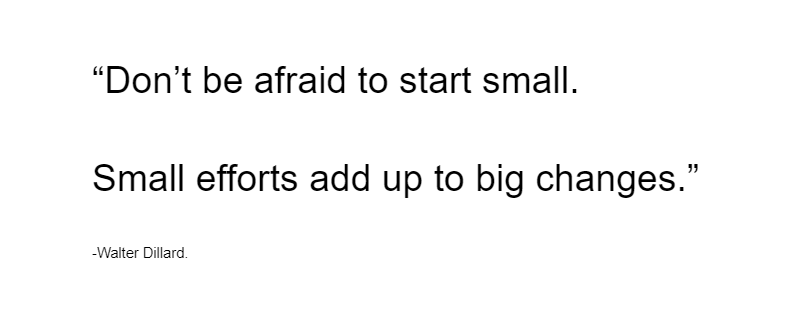
Many people attempt to have great leaps forward in life instead of making incremental changes that add up over time.
This primarily stems from false perception. For example, when a person sees a successful trader on LinkedIn their thought process often goes like this:
-1: I see a rich and happy person.
-2: They must have achieved their success in only a few months.
-3: I can achieve great trading success in just a few months.
What most people don’t see is the fact that success is not an overnight process. Many overnight successes really had many years of frustration and failure before they ended up succeeding. But, since people don’t see the years of struggle, they fail to see that it exists.
So, most people approach their finances like they approach going to the gym. They start by going for 5 hours a day for the first 2 days in order to make massive changes quickly, then give up on day 3.
Instead, I recommend small and incremental changes. These small efforts make a big difference in the long run. Starting by just putting in 10 minutes per day often makes a much larger difference then someone who starts out fast then blows everything even faster.
Small efforts add up to big changes. Never be afraid to start small!
Thanks for reading!
Have a great day!
Best wishes to you!
Cheers!
:)))))))))))))))))))))))
This primarily stems from false perception. For example, when a person sees a successful trader on LinkedIn their thought process often goes like this:
-1: I see a rich and happy person.
-2: They must have achieved their success in only a few months.
-3: I can achieve great trading success in just a few months.
What most people don’t see is the fact that success is not an overnight process. Many overnight successes really had many years of frustration and failure before they ended up succeeding. But, since people don’t see the years of struggle, they fail to see that it exists.
So, most people approach their finances like they approach going to the gym. They start by going for 5 hours a day for the first 2 days in order to make massive changes quickly, then give up on day 3.
Instead, I recommend small and incremental changes. These small efforts make a big difference in the long run. Starting by just putting in 10 minutes per day often makes a much larger difference then someone who starts out fast then blows everything even faster.
Small efforts add up to big changes. Never be afraid to start small!
Thanks for reading!
Have a great day!
Best wishes to you!
Cheers!
:)))))))))))))))))))))))

Walter Joseph Dillard

3 tips on successful trading!
-1: Use compound interest in your favor.
-2: Be willing to put in the time.
-3: Focus on the long term.
-1: Use compound interest in your favor.
I meet so many traders who constantly want to withdraw their profits instead of compounding them. They often say things like, “It’s not real money until I have it in my hands.”
This attitude comes from fear, and from someone who has no trust or confidence in their system. If you’re a gambler, then yes, take your money out.
But, if you’re a truly professional trader it’s best to compound your profits and grow your accounts. After all, compound interest can make you a fortune in just a few years if you’re a consistent trader.
-2: Be willing to put in the time.
Success is built on those who are willing to put in the time and become true professionals.
I’m always shocked by how many people think they can become a world class trader overnight. They think watching a couple youtube videos will then allow them to make a fortune, or a hot tip will make them rich.
That’s not the case. Instead, you need to be willing to put in the time.
Often it takes 10,000 hours or more to fully master something. Trading is no exception to that rule.
I’ve never seen a very successful trader, who stayed successful in the long run, who hasn’t put in at least 10,000 hours.
-3: Focus on the long term.
Many people turn to trading for some fast cash. So, they lose their cash fast.
Trading is not about quick money or overnight riches. Trading is about building and multiplying long term wealth.
You can make a lot of money trading, but that’s not going to happen overnight or on a single trade.
Instead focus on how your plan can grow your wealth over years and not just hoping it’ll pay off your debts at the end of this month.
Thanks for reading!
Have a great day!
Best wishes to you!
Cheers!
:))))))))))))))))))))))))
-1: Use compound interest in your favor.
-2: Be willing to put in the time.
-3: Focus on the long term.
-1: Use compound interest in your favor.
I meet so many traders who constantly want to withdraw their profits instead of compounding them. They often say things like, “It’s not real money until I have it in my hands.”
This attitude comes from fear, and from someone who has no trust or confidence in their system. If you’re a gambler, then yes, take your money out.
But, if you’re a truly professional trader it’s best to compound your profits and grow your accounts. After all, compound interest can make you a fortune in just a few years if you’re a consistent trader.
-2: Be willing to put in the time.
Success is built on those who are willing to put in the time and become true professionals.
I’m always shocked by how many people think they can become a world class trader overnight. They think watching a couple youtube videos will then allow them to make a fortune, or a hot tip will make them rich.
That’s not the case. Instead, you need to be willing to put in the time.
Often it takes 10,000 hours or more to fully master something. Trading is no exception to that rule.
I’ve never seen a very successful trader, who stayed successful in the long run, who hasn’t put in at least 10,000 hours.
-3: Focus on the long term.
Many people turn to trading for some fast cash. So, they lose their cash fast.
Trading is not about quick money or overnight riches. Trading is about building and multiplying long term wealth.
You can make a lot of money trading, but that’s not going to happen overnight or on a single trade.
Instead focus on how your plan can grow your wealth over years and not just hoping it’ll pay off your debts at the end of this month.
Thanks for reading!
Have a great day!
Best wishes to you!
Cheers!
:))))))))))))))))))))))))

Walter Joseph Dillard
Many people look for quick fixes to their problems instead of effective longer term solutions to their problems.
Trading is something that attracts a lot of people looking for quick fixes and quick ways to make a lot of money. I meet people all the time looking for exactly that, and that’s just part of the community we all must accept.
Trading is something that can make you a lot lot of money, but primarily that’s over time through compound interest, and isn’t an overnight windfall.
Just earlier this week I was speaking to a potential client on the subject of account management.
Since I founded a company that manages accounts for hedge funds and retail traders alike, I talk with many people from many walks of life looking for many different results. Most hedge funds want 30% to 50% per year with 10% max drawdown, and most reasonable retail traders want 100% to 300% per year with up to 50% max drawdown. And then there are people like this one.
This potential client asked me for live track record data and I provided it. He then went on to say that my drawdowns were way too high for the amount of profit generated. I then asked him what kind of profit to drawdown ratio he specifically wanted.
After all, many hedge funds want a yearly profit to drawdown ratio between 2:1 and 5:1 and many of my systems are in that range or above it.
I never got a reply, likely because he never considered what a profit to drawdown ratio was and wanted a magical system that could make 80,000% per year with 1% drawdown.
I meet a lot of people looking for magical systems like that instead of considering ways they can make solid amounts of real money. Earning 200% per year can easily make you a millionaire in 7 years starting with $500. Yet many are unwilling to wait 7 years and just want a million now.
Ultimately I’ve never seen anyone who tries to get rich quick ever consistently succeed and keep what they earn if they do succeed. Quick fixes only cause worse financial problems and don’t solve current ones.
But indeed, there is a lot of money to be made long term in trading, but only if you’re willing to use a little time and use compound interest in your favor.
Thanks for reading!
Have a great day!
Cheers!
:))))))))))))))))))))))))))
Trading is something that attracts a lot of people looking for quick fixes and quick ways to make a lot of money. I meet people all the time looking for exactly that, and that’s just part of the community we all must accept.
Trading is something that can make you a lot lot of money, but primarily that’s over time through compound interest, and isn’t an overnight windfall.
Just earlier this week I was speaking to a potential client on the subject of account management.
Since I founded a company that manages accounts for hedge funds and retail traders alike, I talk with many people from many walks of life looking for many different results. Most hedge funds want 30% to 50% per year with 10% max drawdown, and most reasonable retail traders want 100% to 300% per year with up to 50% max drawdown. And then there are people like this one.
This potential client asked me for live track record data and I provided it. He then went on to say that my drawdowns were way too high for the amount of profit generated. I then asked him what kind of profit to drawdown ratio he specifically wanted.
After all, many hedge funds want a yearly profit to drawdown ratio between 2:1 and 5:1 and many of my systems are in that range or above it.
I never got a reply, likely because he never considered what a profit to drawdown ratio was and wanted a magical system that could make 80,000% per year with 1% drawdown.
I meet a lot of people looking for magical systems like that instead of considering ways they can make solid amounts of real money. Earning 200% per year can easily make you a millionaire in 7 years starting with $500. Yet many are unwilling to wait 7 years and just want a million now.
Ultimately I’ve never seen anyone who tries to get rich quick ever consistently succeed and keep what they earn if they do succeed. Quick fixes only cause worse financial problems and don’t solve current ones.
But indeed, there is a lot of money to be made long term in trading, but only if you’re willing to use a little time and use compound interest in your favor.
Thanks for reading!
Have a great day!
Cheers!
:))))))))))))))))))))))))))
Walter Joseph Dillard
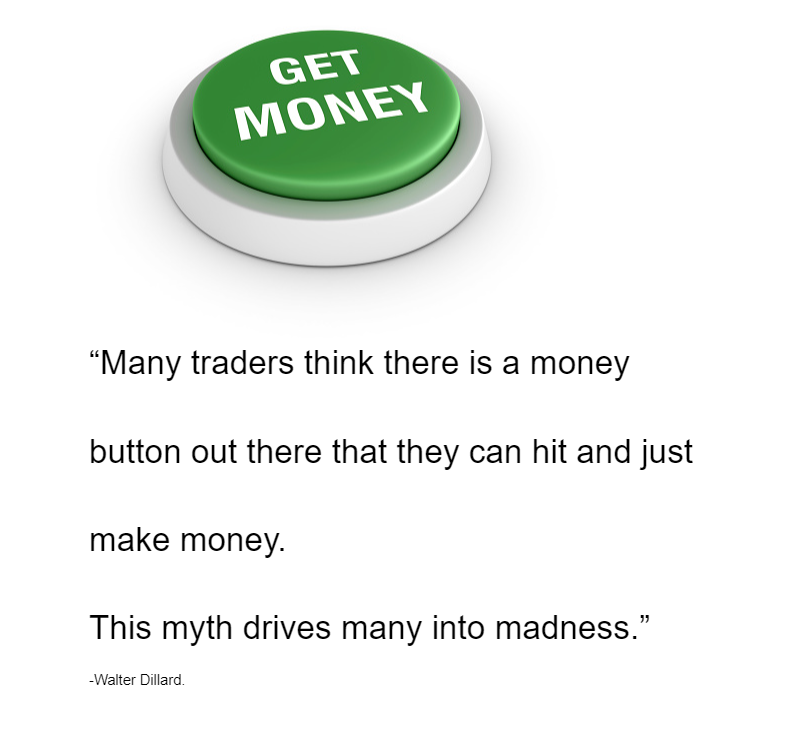
Most people seem to think there is a money button out there.
They think there is a button that when they push it they’ll just make money. So, many traders search the internet for this money button so they can start pushing it over and over and over again.
Many get deeply into debt, sure that when they find their money button they’ll finally be rich.
A lot of money is made selling money buttons. They’re as real as the X-ray specs in the back of comic books, yet people shell out billions of dollars per year for these so-called money buttons that consistently don’t work.
Yet after every sham and every scam, people keep searching for their money button. They cling to this myth of the money button and refuse to let it go. They want so desperately to be rich and to just have a simple button they can push that will always make them a ton of money.
The truth of trading is there is no such thing as a money button.
Yes, you can consistently make a lot of money as a trader, but it won’t be magical and it won’t be as easy as finding and pushing a button. To be a great trader you need to put the time and work into learning how to trade properly. This is usually 10,000 hours plus of work. Putting in these hours and learning effectively is an absolute must to succeed on your own.
If you’re willing to do the work, make mistakes, learn, and improve, then you can become a very rich trader. Or you can keep looking for that money button. Regardless, I wish you the best on your trading journey whether you’ve already made it or are just taking the first step.
Thanks for reading!
Have a great day!
Cheers!
:))))))))))))))))))))))))))
They think there is a button that when they push it they’ll just make money. So, many traders search the internet for this money button so they can start pushing it over and over and over again.
Many get deeply into debt, sure that when they find their money button they’ll finally be rich.
A lot of money is made selling money buttons. They’re as real as the X-ray specs in the back of comic books, yet people shell out billions of dollars per year for these so-called money buttons that consistently don’t work.
Yet after every sham and every scam, people keep searching for their money button. They cling to this myth of the money button and refuse to let it go. They want so desperately to be rich and to just have a simple button they can push that will always make them a ton of money.
The truth of trading is there is no such thing as a money button.
Yes, you can consistently make a lot of money as a trader, but it won’t be magical and it won’t be as easy as finding and pushing a button. To be a great trader you need to put the time and work into learning how to trade properly. This is usually 10,000 hours plus of work. Putting in these hours and learning effectively is an absolute must to succeed on your own.
If you’re willing to do the work, make mistakes, learn, and improve, then you can become a very rich trader. Or you can keep looking for that money button. Regardless, I wish you the best on your trading journey whether you’ve already made it or are just taking the first step.
Thanks for reading!
Have a great day!
Cheers!
:))))))))))))))))))))))))))

Walter Joseph Dillard
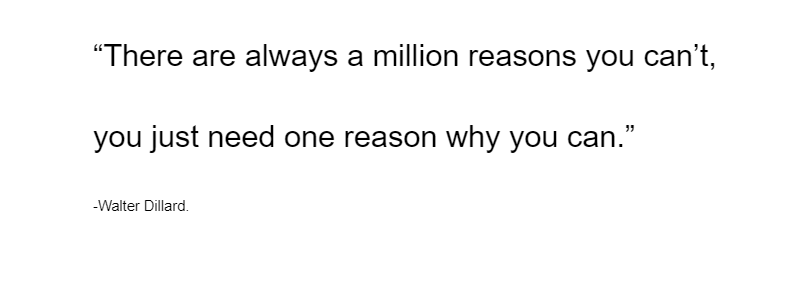
I meet traders all over the world, and that’s something I love about what I do.
I get to see people who succeed at trading and enrich themselves all over the globe. I also see people who suffer great losses all over the globe as well.
Many people come to me in search of salvation from their debts and problems, thinking that a few dollars will be all it takes for them to stop losing a fortune in the market every day.
This is not the case. The primary thing that allows anyone to succeed or fail at trading is their own mindset.
Trading is an elite game where you need to be the best at what you do and be able to make a profit in a game where most fail out.
Being a professional trader is like being a professional athlete or professional actor. Many try, yet only a rare few have what it takes to be the best.
Still, anyone can be a great trader if they are willing to put in the time and effort to do so. There are a million reasons why you can’t do it, but you just need one reason why you can do it.
Listen and be inspired by the reasons that you can and don’t listen to reasons why you can’t. Don’t ignore risk, but do learn to manage it and understand it.
What you have to do to be a successful trader is not hard. Who you have to become to be a successful trader is what stops most people from being successful in the world of trading.
Thanks for reading!
Have a great day!
Cheers!
:)))))))))))))))))))))))))))
I get to see people who succeed at trading and enrich themselves all over the globe. I also see people who suffer great losses all over the globe as well.
Many people come to me in search of salvation from their debts and problems, thinking that a few dollars will be all it takes for them to stop losing a fortune in the market every day.
This is not the case. The primary thing that allows anyone to succeed or fail at trading is their own mindset.
Trading is an elite game where you need to be the best at what you do and be able to make a profit in a game where most fail out.
Being a professional trader is like being a professional athlete or professional actor. Many try, yet only a rare few have what it takes to be the best.
Still, anyone can be a great trader if they are willing to put in the time and effort to do so. There are a million reasons why you can’t do it, but you just need one reason why you can do it.
Listen and be inspired by the reasons that you can and don’t listen to reasons why you can’t. Don’t ignore risk, but do learn to manage it and understand it.
What you have to do to be a successful trader is not hard. Who you have to become to be a successful trader is what stops most people from being successful in the world of trading.
Thanks for reading!
Have a great day!
Cheers!
:)))))))))))))))))))))))))))

Walter Joseph Dillard
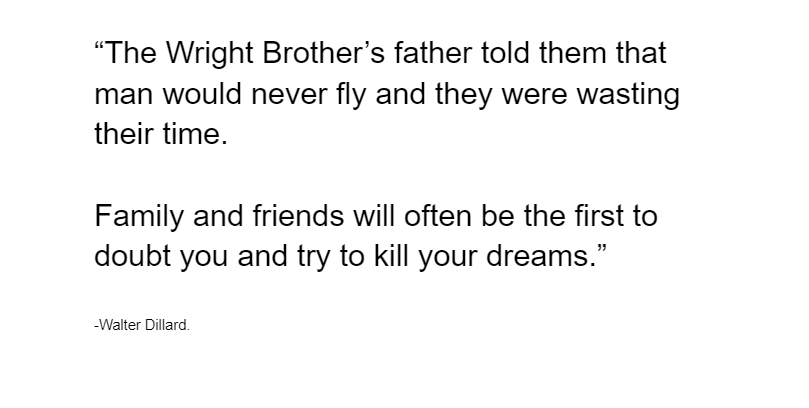
The Wright Brothers proved in 1903 that indeed man could fly. However, even their own father told them that they couldn’t do it.
“If man was meant to fly, God would have given him wings,” was a popular expression at the time.
The Wright Brother’s father was a respected member of the church and he told them that indeed man would never fly and they were wasting their time.
Always remember that your family and friends will often be the first to tell you that you aren’t good enough, that you can’t do something, that your dreams cannot be obtained.
You have to love your family and friends, but you also have to know when to listen to them and when not to.
A dream is a bold thing. It is something that isn’t obvious to everyone, or else everyone would be doing it. To succeed you need to have dreams beyond the imaginings of most people and the dedication to make them happen.
Even when their own father told them they couldn’t do it, the Wright brothers changed history and proved that indeed man could fly.
Before you let your friends and family talk you out of your dreams, make sure to remember the Wright brothers and remember who was right in the end.
“If man was meant to fly, God would have given him wings,” was a popular expression at the time.
The Wright Brother’s father was a respected member of the church and he told them that indeed man would never fly and they were wasting their time.
Always remember that your family and friends will often be the first to tell you that you aren’t good enough, that you can’t do something, that your dreams cannot be obtained.
You have to love your family and friends, but you also have to know when to listen to them and when not to.
A dream is a bold thing. It is something that isn’t obvious to everyone, or else everyone would be doing it. To succeed you need to have dreams beyond the imaginings of most people and the dedication to make them happen.
Even when their own father told them they couldn’t do it, the Wright brothers changed history and proved that indeed man could fly.
Before you let your friends and family talk you out of your dreams, make sure to remember the Wright brothers and remember who was right in the end.

Walter Joseph Dillard
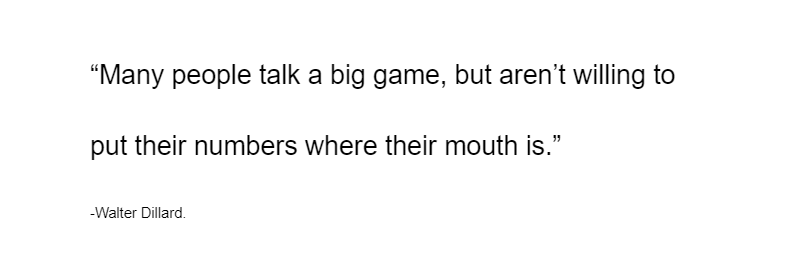
I was recently talking with a trader on LinkedIn who went out of his way to insult my trading and said he easily earned 4 times the return rate that I did, consistently making over 50% per month.
I said, “Great, I’d love to see your myfxbook!”
He quickly came up with every excuse under the sun about why not to show it to me and why he didn’t use myfxbook and why his screenshots were good enough proof of his ability.
I find characters like this a lot. They talk a big game, but really have no results to speak of. Sure, they may hope to someday have real results, but if they did, they’d show their myfxbook.
Myfxbook is free and it connects to over 3000 brokers. It takes 5 minutes for anyone to set up and is a great way to prove your trading results.
Is it a perfect tool? No.
Is it a great tool that eliminates 99% of scammers? Yes.
Scammers and big talkers are a major problem in the trading community. They ruin transparency, create wildly unrealistic expectations that other traders try to match, and all around are just terrible.
It’s time we all always demand myfxbook so that people are willing to prove their results.
Thanks for reading!
Have a great day!
Cheers!
:)))))))))))))))))))))))))))))))
I said, “Great, I’d love to see your myfxbook!”
He quickly came up with every excuse under the sun about why not to show it to me and why he didn’t use myfxbook and why his screenshots were good enough proof of his ability.
I find characters like this a lot. They talk a big game, but really have no results to speak of. Sure, they may hope to someday have real results, but if they did, they’d show their myfxbook.
Myfxbook is free and it connects to over 3000 brokers. It takes 5 minutes for anyone to set up and is a great way to prove your trading results.
Is it a perfect tool? No.
Is it a great tool that eliminates 99% of scammers? Yes.
Scammers and big talkers are a major problem in the trading community. They ruin transparency, create wildly unrealistic expectations that other traders try to match, and all around are just terrible.
It’s time we all always demand myfxbook so that people are willing to prove their results.
Thanks for reading!
Have a great day!
Cheers!
:)))))))))))))))))))))))))))))))

Walter Joseph Dillard

One of the hardest parts of trading psychology for many people is trusting their successful system.
By the time a trader creates or discovers a successful system they have usually been through at least a dozen failures with previous systems.
Even though they know this system is different and has proven itself in the live market, those dozen plus failures leave them hesitant, as their fears tell them that this system too will fail.
The solution to this is simple. It’s just a matter of if you learned why the systems before failed and how the current system is different from your previous mistakes.
Making mistakes is essential to learning, but not learning from your mistakes gives you great odds of making the same mistake over and over again forever.
Thanks for reading!
Have a great day!
Cheers! 🥂
:))))))))))))))
By the time a trader creates or discovers a successful system they have usually been through at least a dozen failures with previous systems.
Even though they know this system is different and has proven itself in the live market, those dozen plus failures leave them hesitant, as their fears tell them that this system too will fail.
The solution to this is simple. It’s just a matter of if you learned why the systems before failed and how the current system is different from your previous mistakes.
Making mistakes is essential to learning, but not learning from your mistakes gives you great odds of making the same mistake over and over again forever.
Thanks for reading!
Have a great day!
Cheers! 🥂
:))))))))))))))

Walter Joseph Dillard
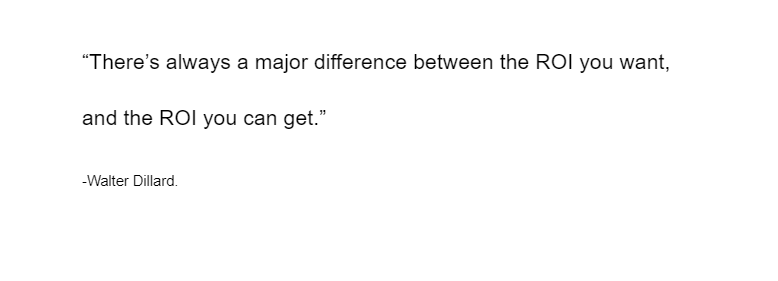
ROI, return on investment, is a very important component of trading.
The higher the ROI, the better. After all, the more money you can make off your trading, the better.
However, many people have very unrealistic and unreachable ideas for the ROI that they can obtain. Often this is thanks to scammers showing off screenshots of their results then people believing that those results are obtainable consistently in the real market.
I know many traders who are constantly searching for systems to make 100% per month or more. They search and search and only manage to find scammer after scammer.
I personally find that the sweet spot for ROI is an average monthly return of around 5% to 10%. Now of course there are more options if you want an ROI of 3% per month or less, but most people want higher and higher unrealistic ROIs.
Many people keep going for that 100% per month or more, and so keep failing time and time again. The thing that keeps them going are these scammers and their screenshots along with the fact that sometimes they have 100% months.
The boom and bust cycle is addictive, leaving many to think that this time things will be different and they can get the boom without the bust. However this is a trap that 60% of traders get stuck in and never escape.
Overall I recommend starting with focusing on smaller ROIs and scaling up over time instead of focusing on huge ROIs and constantly failing to reach those targets.
Now, I’m not saying don’t have big dreams or don’t go for what you want, but what I am saying is that it’s important to focus on consistency and what can actually be achieved instead of chasing the impossible.
The consistent traders that succeed in the market do not get 100% ROI per month on their trading, so to be a consistent winner it’s important to learn to get stable returns not boom and busts.
Thanks for reading!
Have a great day!
Cheers!
:)))))))))))))))))))))))))))))))))
The higher the ROI, the better. After all, the more money you can make off your trading, the better.
However, many people have very unrealistic and unreachable ideas for the ROI that they can obtain. Often this is thanks to scammers showing off screenshots of their results then people believing that those results are obtainable consistently in the real market.
I know many traders who are constantly searching for systems to make 100% per month or more. They search and search and only manage to find scammer after scammer.
I personally find that the sweet spot for ROI is an average monthly return of around 5% to 10%. Now of course there are more options if you want an ROI of 3% per month or less, but most people want higher and higher unrealistic ROIs.
Many people keep going for that 100% per month or more, and so keep failing time and time again. The thing that keeps them going are these scammers and their screenshots along with the fact that sometimes they have 100% months.
The boom and bust cycle is addictive, leaving many to think that this time things will be different and they can get the boom without the bust. However this is a trap that 60% of traders get stuck in and never escape.
Overall I recommend starting with focusing on smaller ROIs and scaling up over time instead of focusing on huge ROIs and constantly failing to reach those targets.
Now, I’m not saying don’t have big dreams or don’t go for what you want, but what I am saying is that it’s important to focus on consistency and what can actually be achieved instead of chasing the impossible.
The consistent traders that succeed in the market do not get 100% ROI per month on their trading, so to be a consistent winner it’s important to learn to get stable returns not boom and busts.
Thanks for reading!
Have a great day!
Cheers!
:)))))))))))))))))))))))))))))))))

Walter Joseph Dillard
There are 4 fundamental trading fears, and the worst one for most traders is the fear of missing out.
Well known as FOMO, the fear of missing out is a fear that drives people to trade or jump into positions that they shouldn’t because they don’t want to miss out on profits.
The clear sign of the fear being present and affecting your trading is if you find yourself overtrading and getting into too many trades. If you’re under trading then this isn’t a fear you’re suffering from.
For many people it’s a battle between wanting to not lose money and the fear of missing out on making money, so they don’t stick to their rules or trading edge and merely leap into the market when they most fear missing out.
The way to cure this fear is to tie yourself to trading rules and not allow yourself to trade if you are not following your rules. Just as Odysseus tied himself to the mast of the ship to avoid leaping overboard when hearing the siren’s songs, we must all tie ourselves to trading rules and obey them no matter what.
Thanks for reading!
Have a great day!
Cheers!
:)))))))))))))))))))))))))))))))))
Well known as FOMO, the fear of missing out is a fear that drives people to trade or jump into positions that they shouldn’t because they don’t want to miss out on profits.
The clear sign of the fear being present and affecting your trading is if you find yourself overtrading and getting into too many trades. If you’re under trading then this isn’t a fear you’re suffering from.
For many people it’s a battle between wanting to not lose money and the fear of missing out on making money, so they don’t stick to their rules or trading edge and merely leap into the market when they most fear missing out.
The way to cure this fear is to tie yourself to trading rules and not allow yourself to trade if you are not following your rules. Just as Odysseus tied himself to the mast of the ship to avoid leaping overboard when hearing the siren’s songs, we must all tie ourselves to trading rules and obey them no matter what.
Thanks for reading!
Have a great day!
Cheers!
:)))))))))))))))))))))))))))))))))
Walter Joseph Dillard
Many “traders” think they are good at risk management when really they simply are not.
A lot of them think that adding a stop loss is all there is to risk management. However, that is only scratching the surface.
Arbitrary rules are a great thing to test, but implementing them without testing them is the main area where “traders” go wrong.
Many people have an idea so they try it out in the live market. They have a good hypothesis of what will work but they don’t bother to make sure that it’s actually profitable before putting their hard earned money behind it.
Be it forward testing or backtesting, testing a strategy is the most important aspect of risk management. Testing provides you with data about how well the strategy actually works.
Personally what I recommend is backtesting then forward testing, then comparative backtesting. I personally test all my strategies as far back as tick data is available, usually to 2006 or 2007. I then forward test them for months at a time. After that, I backtest back over the period I forward tested and compare the backtest results to the forward test results.
This comparative backtest approach shows the variation between your backtest and forward test and gives you a good statistical measure for how accurate your many years of backtesting are.
So, what does this have to do with risk management?
Well risk management really is about how to mitigate risk with your strategy. The biggest part of that is performance data on a fixed strategy with fixed rules and how well the strategy performs.
Testing is an essential part of this process and one that all too many people skip over in favor of a simple stop loss and backing a losing strategy because they feel like it should work.
Thanks for reading!
Have a great day!
Cheers!
:)))))))))))))))))))))))))
A lot of them think that adding a stop loss is all there is to risk management. However, that is only scratching the surface.
Arbitrary rules are a great thing to test, but implementing them without testing them is the main area where “traders” go wrong.
Many people have an idea so they try it out in the live market. They have a good hypothesis of what will work but they don’t bother to make sure that it’s actually profitable before putting their hard earned money behind it.
Be it forward testing or backtesting, testing a strategy is the most important aspect of risk management. Testing provides you with data about how well the strategy actually works.
Personally what I recommend is backtesting then forward testing, then comparative backtesting. I personally test all my strategies as far back as tick data is available, usually to 2006 or 2007. I then forward test them for months at a time. After that, I backtest back over the period I forward tested and compare the backtest results to the forward test results.
This comparative backtest approach shows the variation between your backtest and forward test and gives you a good statistical measure for how accurate your many years of backtesting are.
So, what does this have to do with risk management?
Well risk management really is about how to mitigate risk with your strategy. The biggest part of that is performance data on a fixed strategy with fixed rules and how well the strategy performs.
Testing is an essential part of this process and one that all too many people skip over in favor of a simple stop loss and backing a losing strategy because they feel like it should work.
Thanks for reading!
Have a great day!
Cheers!
:)))))))))))))))))))))))))
Walter Joseph Dillard
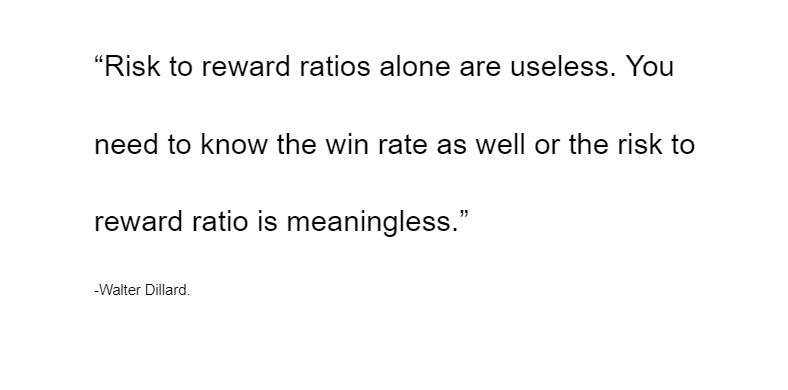
Risk to reward ratios are a worthless tool if you don’t know the win rate as well.
I deal with people all the time who think that a very good risk to reward ratio is needed on every single trade. Often people think a RRR of 1:3 or more is needed on every single trade.
The problem is that people take risk and reward ratios alone in a vacuum without considering the win rate.
After all, if you win only 5% of the time, then a system with an RRR of 1:3 is a massively losing system.
Meanwhile if you have a system with a 35:1 RRR but a win rate of 97.3% then that’s a winning system. (This is the exact case with roulette. If you think an RRR of 35:1 can’t work, then you’re essentially saying that the billions of dollar casinos have earned off roulette going back 300 years is merely luck and soon the casinos will lose all their money to gamblers. Do you really believe that? If so please say so in the comments!)
Again, it’s just two components.
-1: The risk to reward ratio.
-2: The win rate.
Examples.
-1:
-1:50 RRR.
-0.00000001% win rate.
-System = bad.
-2:
-5:1 RRR.
- 90% win rate.
-System = good.
As you can see, a risk to reward ratio alone tells you nothing. The win rate and the risk to reward ratio always need to be used in conjunction. You really can’t use one to evaluate any trading system without the other.
Thanks for reading!
Have a great day!
Cheers!
:))))))))))))))))))))))
I deal with people all the time who think that a very good risk to reward ratio is needed on every single trade. Often people think a RRR of 1:3 or more is needed on every single trade.
The problem is that people take risk and reward ratios alone in a vacuum without considering the win rate.
After all, if you win only 5% of the time, then a system with an RRR of 1:3 is a massively losing system.
Meanwhile if you have a system with a 35:1 RRR but a win rate of 97.3% then that’s a winning system. (This is the exact case with roulette. If you think an RRR of 35:1 can’t work, then you’re essentially saying that the billions of dollar casinos have earned off roulette going back 300 years is merely luck and soon the casinos will lose all their money to gamblers. Do you really believe that? If so please say so in the comments!)
Again, it’s just two components.
-1: The risk to reward ratio.
-2: The win rate.
Examples.
-1:
-1:50 RRR.
-0.00000001% win rate.
-System = bad.
-2:
-5:1 RRR.
- 90% win rate.
-System = good.
As you can see, a risk to reward ratio alone tells you nothing. The win rate and the risk to reward ratio always need to be used in conjunction. You really can’t use one to evaluate any trading system without the other.
Thanks for reading!
Have a great day!
Cheers!
:))))))))))))))))))))))

Walter Joseph Dillard

Many people say that trading is too risky. I see what they do as too risky.
I grew up going to schools that promoted safe and secure jobs. Safe and secure jobs are what most of my classmates went on to get after going to college.
Now, many people see that I trade and say that trading is too risky.
Not only do I disagree, as trading is not risky, but I in fact see many of their jobs and no financial planning as too risky.
I have nothing against good jobs of course, but the financial planning of some of my former classmates seems risky to me. Many people blow nearly their entire income on bad expenses and liabilities. They buy bigger houses and get nicer cars, but financially aren’t building a solid asset column of real wealth and are buying what wealth looks like while acquiring more and more debts.
Personally, I find living on the edge of the financial abyss to be too risky.
So, I trade and build wealth effectively with my trading that I roll over into other forms of investments that deliver positive cash flow in both passive and portfolio income.
I don’t consider that to be risky when you do it legally, correctly, and with expert advice and solid personal experience.
I have friends that work jobs and do this as well, and indeed solid financial planning and building an asset column is not risky. Having a job can be a wonderful thing and I have no disrespect for anyone who has a job and earns a nice income from their job.
Still, most people don’t love their jobs but are stuck in them working longer and harder just to make the next debt payment.
There’s also an even greater risk to people trading their time for money if they don’t love their job. They risk putting all of their life and all of their time into a job that makes them miserable and doesn’t create time for them to do what they love.
To me that is too risky.
Thanks for reading!
Have a great day!
Cheers!
:)))))))))))))))))))
I grew up going to schools that promoted safe and secure jobs. Safe and secure jobs are what most of my classmates went on to get after going to college.
Now, many people see that I trade and say that trading is too risky.
Not only do I disagree, as trading is not risky, but I in fact see many of their jobs and no financial planning as too risky.
I have nothing against good jobs of course, but the financial planning of some of my former classmates seems risky to me. Many people blow nearly their entire income on bad expenses and liabilities. They buy bigger houses and get nicer cars, but financially aren’t building a solid asset column of real wealth and are buying what wealth looks like while acquiring more and more debts.
Personally, I find living on the edge of the financial abyss to be too risky.
So, I trade and build wealth effectively with my trading that I roll over into other forms of investments that deliver positive cash flow in both passive and portfolio income.
I don’t consider that to be risky when you do it legally, correctly, and with expert advice and solid personal experience.
I have friends that work jobs and do this as well, and indeed solid financial planning and building an asset column is not risky. Having a job can be a wonderful thing and I have no disrespect for anyone who has a job and earns a nice income from their job.
Still, most people don’t love their jobs but are stuck in them working longer and harder just to make the next debt payment.
There’s also an even greater risk to people trading their time for money if they don’t love their job. They risk putting all of their life and all of their time into a job that makes them miserable and doesn’t create time for them to do what they love.
To me that is too risky.
Thanks for reading!
Have a great day!
Cheers!
:)))))))))))))))))))

Walter Joseph Dillard

Ambition is a wonderful thing. It’s great to have the drive to be great and accomplish great things.
However, novice traders often fail because their goals are too ambitious for what is actually possible.
The novice trader usually starts with $100 and has a goal to earn 10% per day.
They do a quick calculation and see that if they earn 10% per day for 90 days then they’ll have $531,302.00
They see a simple way to get rich, so they go for it.
However, none of them ever accomplish this goal. Sure, they make 10% or more some days, even some weeks, but then give it all back the next week.
A few months back I had a conversation with a novice stock trader who made 45% at the start of the month then lost all his gains by the end of the month. I offered to help him work on his consistency, but he rudely refused and acted as though his trading was far superior to mine.
He was sure that he would be able to separate the wins from the losses and soon earn 45% plus per month. I pity these poor fools, but there’s no helping them as long as they are so sure that they will make it rich quick.
After losing a few times, the novice trader seeks out knowledge and trading services in order to reach their goals. From prop firms to crypto mining websites they look for fast ways to make a lot of money and fall for scam after scam.
If they go for knowledge instead of services then often they learn, but are looking to learn methods that fully explain what will happen in the market well enough to earn 10% per day. Once again, they fail.
Ultimately the best solution is to drop the 10% per day notion and commit to 10% per month or 10% per year instead. Sure, it’s not the overnight fortune that everyone wants, but it actually works. Then you can always scale up with other people’s money and make a fortune in not too much time that way.
10% per day just isn’t a reality.
Thanks for reading!
Have a great day!
Cheers!
:))))))))))))))))))))))
However, novice traders often fail because their goals are too ambitious for what is actually possible.
The novice trader usually starts with $100 and has a goal to earn 10% per day.
They do a quick calculation and see that if they earn 10% per day for 90 days then they’ll have $531,302.00
They see a simple way to get rich, so they go for it.
However, none of them ever accomplish this goal. Sure, they make 10% or more some days, even some weeks, but then give it all back the next week.
A few months back I had a conversation with a novice stock trader who made 45% at the start of the month then lost all his gains by the end of the month. I offered to help him work on his consistency, but he rudely refused and acted as though his trading was far superior to mine.
He was sure that he would be able to separate the wins from the losses and soon earn 45% plus per month. I pity these poor fools, but there’s no helping them as long as they are so sure that they will make it rich quick.
After losing a few times, the novice trader seeks out knowledge and trading services in order to reach their goals. From prop firms to crypto mining websites they look for fast ways to make a lot of money and fall for scam after scam.
If they go for knowledge instead of services then often they learn, but are looking to learn methods that fully explain what will happen in the market well enough to earn 10% per day. Once again, they fail.
Ultimately the best solution is to drop the 10% per day notion and commit to 10% per month or 10% per year instead. Sure, it’s not the overnight fortune that everyone wants, but it actually works. Then you can always scale up with other people’s money and make a fortune in not too much time that way.
10% per day just isn’t a reality.
Thanks for reading!
Have a great day!
Cheers!
:))))))))))))))))))))))

Walter Joseph Dillard

The trades you don’t take are as important as the trades you do take.
Most novice traders don’t know this, and greatly suffer from overtrading thanks to the fear of missing out. (FOMO).
They want so badly not to miss out on trades that they end up jumping into trades that they shouldn’t be getting into.
Most successful traders tend to take 1-3 trades per day, yet the average novice trader takes about 20-30 trades per day.
Ultimately success isn’t found just on the trades you take but on avoiding trades you shouldn’t take.
If you have a good edge that gives you a great advantage in the market it isn’t likely to show up all the time.
Novice traders approach trading like it is hitting a money button, so ultimately overtrade. Meanwhile the truly successful traders have their edge and simply wait for the opportunity to use it properly.
There will always be temptation to overtrade, but only the traders that stick to their edges and keep their emotions in check truly succeed in the long run.
Thanks for reading!
Have a great day!
Cheers!
:)))))))))))))))))))))
Most novice traders don’t know this, and greatly suffer from overtrading thanks to the fear of missing out. (FOMO).
They want so badly not to miss out on trades that they end up jumping into trades that they shouldn’t be getting into.
Most successful traders tend to take 1-3 trades per day, yet the average novice trader takes about 20-30 trades per day.
Ultimately success isn’t found just on the trades you take but on avoiding trades you shouldn’t take.
If you have a good edge that gives you a great advantage in the market it isn’t likely to show up all the time.
Novice traders approach trading like it is hitting a money button, so ultimately overtrade. Meanwhile the truly successful traders have their edge and simply wait for the opportunity to use it properly.
There will always be temptation to overtrade, but only the traders that stick to their edges and keep their emotions in check truly succeed in the long run.
Thanks for reading!
Have a great day!
Cheers!
:)))))))))))))))))))))

Walter Joseph Dillard

Most traders don’t want to learn, they just want to earn.
That’s a simple fact and it makes sense, but it’s extremely bad for these traders.
There are many reasons that people go into trading. The usual reason is because they want to make a lot lot of money from trading.
And that’s a good reason to trade. After all, earning a lot lot of money is a great thing.
However, many traders go in with the wrong attitude: Too much ego, no humility.
Many novice traders think they are going to conquer the financial world in a matter of months, and they act like that too. They don’t want advice, they don’t want to understand trading psychology or set proper plans in place, they just want to get rich and do it quickly.
They look down on consistent returns and act as though they will soon be earning 100% per day and anyone who earns less than that is a fool.
I pity those poor fools, but there’s not much that I can do to help. After all, they are so braggy and sure of themselves that there is no helping them until the market takes all their money, crushes their spirit and credit rating, and hobbles them into humility.
Maybe the egotistical novice trader state is a necessary part of the process. I personally couldn’t say. Regardless, when it comes to actual success and not just theoretical success it’s important to learn from experts and not just to think you know better in all situations.
I think we can all agree on that.
Cheers!
Have a great day!
:)))))))))))))))))))))))))))))))))
That’s a simple fact and it makes sense, but it’s extremely bad for these traders.
There are many reasons that people go into trading. The usual reason is because they want to make a lot lot of money from trading.
And that’s a good reason to trade. After all, earning a lot lot of money is a great thing.
However, many traders go in with the wrong attitude: Too much ego, no humility.
Many novice traders think they are going to conquer the financial world in a matter of months, and they act like that too. They don’t want advice, they don’t want to understand trading psychology or set proper plans in place, they just want to get rich and do it quickly.
They look down on consistent returns and act as though they will soon be earning 100% per day and anyone who earns less than that is a fool.
I pity those poor fools, but there’s not much that I can do to help. After all, they are so braggy and sure of themselves that there is no helping them until the market takes all their money, crushes their spirit and credit rating, and hobbles them into humility.
Maybe the egotistical novice trader state is a necessary part of the process. I personally couldn’t say. Regardless, when it comes to actual success and not just theoretical success it’s important to learn from experts and not just to think you know better in all situations.
I think we can all agree on that.
Cheers!
Have a great day!
:)))))))))))))))))))))))))))))))))

Walter Joseph Dillard

3 quick trading tips part 2!
-1: Have a clear trading plan.
-2: Reinvest and compound your profits.
-3: Be the best at what you do.
-1: If you get on a plane you have a clear destination. Would you get on a plane and say, “Fly me anywhere?” I doubt it. Yet most people don’t have a clear trading plan and are doing just that.
I personally recommend 3 trading plans. 1 for security, 1 for comfort, and 1 for getting rich.
It’s important to have all 3 trading plans and not just the last 1.
-2: Compound interest is extremely powerful. If you reinvest your profits then you can really grow your capital. Many people instead withdraw their profits. While there is a time to do that, it’s important to grow your capital. If you truly have an edge in the market then it’s foolish to not compound your profits.
-3: To make the big bucks you really need to be the best at what you do. 90% of traders are losers or boom and busters. 10% are consistent winners, but only 1% are the big winners.
If you want to really succeed you need to be in the top 1% of all traders, which isn’t too hard to do, but is a necessity.
Thanks for reading!
Have a great day!
Cheers!
:)))))))))))
-1: Have a clear trading plan.
-2: Reinvest and compound your profits.
-3: Be the best at what you do.
-1: If you get on a plane you have a clear destination. Would you get on a plane and say, “Fly me anywhere?” I doubt it. Yet most people don’t have a clear trading plan and are doing just that.
I personally recommend 3 trading plans. 1 for security, 1 for comfort, and 1 for getting rich.
It’s important to have all 3 trading plans and not just the last 1.
-2: Compound interest is extremely powerful. If you reinvest your profits then you can really grow your capital. Many people instead withdraw their profits. While there is a time to do that, it’s important to grow your capital. If you truly have an edge in the market then it’s foolish to not compound your profits.
-3: To make the big bucks you really need to be the best at what you do. 90% of traders are losers or boom and busters. 10% are consistent winners, but only 1% are the big winners.
If you want to really succeed you need to be in the top 1% of all traders, which isn’t too hard to do, but is a necessity.
Thanks for reading!
Have a great day!
Cheers!
:)))))))))))

Walter Joseph Dillard
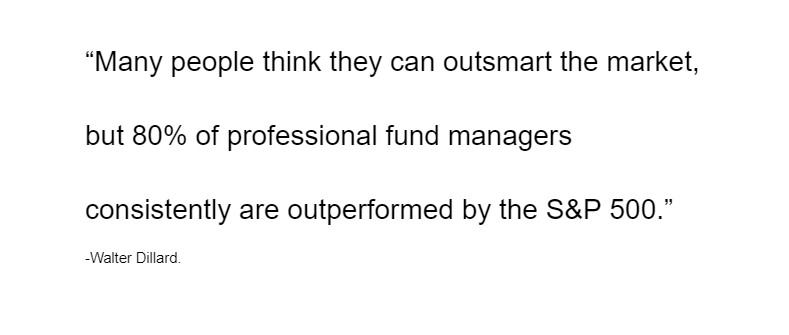
Many people believe their intuition and insights will allow them to outsmart and outperform the market.
However, intuition statistically isn’t as good as a purely mechanical strategy.
80% of professional fund managers picking specific stocks are outperformed by the S&P 500. That’s simply a fact.
That’s not to say you can’t pick good stocks, but just means that most people think they can pick really high performing stocks yet in reality would be better off just buying the S&P 500 purely mechanically.
Many think that intuition holds some magic, some super powered insight that allows them to see the truth. In reality, intuition just statistically isn’t worth putting too much stock in.
Don’t get me wrong, it’s important to listen to what your intuition has to say and to look into it. Sometimes you’ll get a great idea and it’s most definitely looking into. However, too many people go straight from having a thought to acting on it without looking into it and verifying it first.
At the end of the day, intuition can be very valuable, but it has its limitations and overall isn’t as good as purely mechanical strategies tend to be based on the statistics.
If you don’t believe me, please read the book, “What Works on Wall Street.” It goes into far more detail on this exact matter.
Thanks for reading!
Have a great day!
Cheers!
:)))))))))))))))))))))))))))))))))))))))
However, intuition statistically isn’t as good as a purely mechanical strategy.
80% of professional fund managers picking specific stocks are outperformed by the S&P 500. That’s simply a fact.
That’s not to say you can’t pick good stocks, but just means that most people think they can pick really high performing stocks yet in reality would be better off just buying the S&P 500 purely mechanically.
Many think that intuition holds some magic, some super powered insight that allows them to see the truth. In reality, intuition just statistically isn’t worth putting too much stock in.
Don’t get me wrong, it’s important to listen to what your intuition has to say and to look into it. Sometimes you’ll get a great idea and it’s most definitely looking into. However, too many people go straight from having a thought to acting on it without looking into it and verifying it first.
At the end of the day, intuition can be very valuable, but it has its limitations and overall isn’t as good as purely mechanical strategies tend to be based on the statistics.
If you don’t believe me, please read the book, “What Works on Wall Street.” It goes into far more detail on this exact matter.
Thanks for reading!
Have a great day!
Cheers!
:)))))))))))))))))))))))))))))))))))))))

: